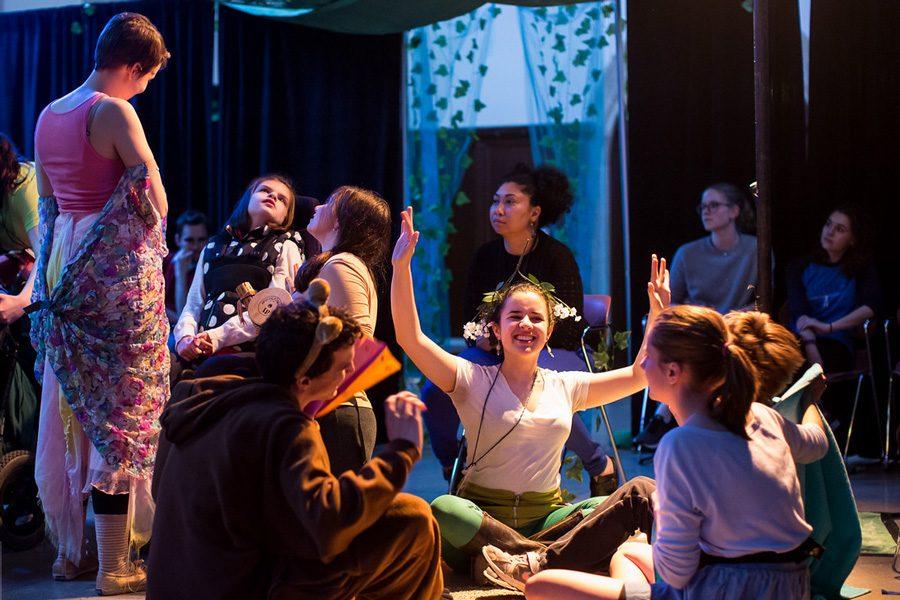New annual festival embraces people with disabilities into the theater world
Seesaw Theatre adventure guides perform with disabled children during the show “Earth,” which was their spring production.
November 17, 2016
For Seesaw Theatre’s show this spring, Communication sophomore Christina Layton asked the mother of a child who uses a wheelchair to let her hold him in her arms. During a portion of the play that had the children fly around the room like butterflies, she said she held the young boy the entire time and helped him fly with his friends.
“He wasn’t verbal, but I just remember him showing so much joy and the biggest smile on his face,” Layton said. “And his mom told me that she hadn’t seen that in him in a really long time. It’s moments like that, the moments where something clicks and you have a really individualized experience with one kid that makes everything you’re doing worth it.”
Seesaw Theatre is a student group at NU which specializes in inclusive theater, a form of the arts that focuses on performing for children with autism spectrum disorder and other developmental differences. In an effort to share moments like Layton’s with a wider audience, Seesaw will be holding its first Inclusive Theatre Festival, scheduled for Nov. 19.
“It is so important for us to have this open dialogue with professionals that are currently working in this new field and getting to learn from them and share experiences,” said Layton, the event’s organizer.
The festival will include a roundtable discussion with seven professionals in Chicago who work in inclusive arts, including Claire Huntington (SESP ’15), the founder of Bluelaces Theatre Company, which provides interactive performances for children with developmental differences. Six tables will be set up for a multisensory experience, with each table representing a different sense.
Ira Kriston, the festival’s keynote speaker, has been working closely with Seesaw Theatre for the past four years. Since the early days of the group, he said he has been able to share his perspective as an autistic person to help create inclusive programming. For his presentation, Kriston said he will focus on the ways educators and artists can treat people with autism.
“It’s important for teachers to do things that work best for the individual,” he said. “Instead of lumping people into one big box, it’s a lot better to get to know the individual and what works best for (them).”
Kriston said he is eager to see the festival help people become more open-minded. Autistic people have different strengths and differences, so even the easiest tasks may be difficult to them, he said.
“Growing up my whole life … it was always a challenge because I was consistently in the minority and outnumbered,” he said. “I have my sensory issues and stuff. (Neurotypical people) might be having fun, but they weren’t ever thinking about how hard it was for me.”
Though catering to the needs of every child may be difficult at times, Layton said the gratifying moments make the effort worth the work all the members put in, a feeling she hopes she can spread throughout the Northwestern community with this festival.
Communication senior Maddie Napel, the executive director of Seesaw Theatre, agreed that there is no better time than now, in the days following the election, to promote the inclusion of those with disabilities in the arts.
“There is not a more important time than right now to give a voice to people with disabilities and to artists who are trying to make meaningful work,” she said. “We use (the festival) as a way to learn what is going on in the world that is positive.”
This story was updated Friday at 1 p.m. to clarify language surrounding autism.
Email: catherinekim2020@u.northwestern.edu
Twitter: @ck_525



